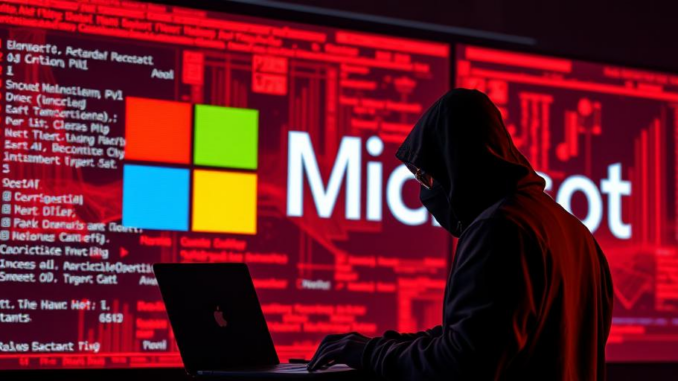
Summary
Microsoft reveals that North Korean state-sponsored hackers, known as Moonstone Sleet, have started using Qilin ransomware. This marks a shift in their tactics, as they previously used only custom-built ransomware. This development raises concerns about the evolving ransomware landscape and the increasing collaboration between nation-state actors and ransomware-as-a-service operations.
Explore the data solution with built-in protection against ransomware TrueNAS.
** Main Story**
So, get this – Microsoft’s threat intelligence team just dropped a bombshell: North Korean hackers, specifically the crew known as Moonstone Sleet (formerly Storm-1789), are now using Qilin ransomware. You know, instead of just sticking to their own custom stuff. It’s the first time they’ve been caught using ransomware developed by a Ransomware-as-a-Service (RaaS) outfit. And honestly, it makes you wonder, doesn’t it, if this is the start of a bigger trend: nation-state actors cozying up to RaaS for their dirty work.
Moonstone Sleet: More Than Just Hackers
This group, Moonstone Sleet, isn’t just about the tech; they’re pretty savvy when it comes to social engineering. Their main goals are financial gain and, you know, a little cyberespionage on the side. They sneak in by using infected versions of regular programs, like PuTTY. Plus, they spread malicious games and even compromised npm packages, not to mention creating fake software companies to lure people in.
I remember reading about one of their fake companies; something like ‘C.C. Waterfall’ or ‘StarGlow Ventures.’ Pretty convincing stuff. They use these personas to connect with potential victims on LinkedIn, freelancing sites, Telegram, you name it. It’s a whole operation designed to get them inside target organizations.
Qilin Ransomware: The Rising Star (or Notorious Villain?)
Now, Qilin, these guys have been around since August 2022. Started out as ‘Agenda,’ and at first, they didn’t make much of a splash. But then, towards the end of 2023, things picked up. They launched a Linux encryptor aimed at VMware ESXi virtual machines. That got people’s attention. The ransom demands? They’re all over the place, anywhere from $25,000 to millions, depending on who they’re hitting. It’s opportunistic, I guess.
Some of their bigger scalps include Yangfeng, the automotive folks; Lee Enterprises, the newspaper publisher; and even Australia’s Court Services Victoria. But the one that really hit home was the attack on Synnovis. That caused chaos for NHS hospitals in London – hundreds of operations and appointments got canceled. Can you imagine?
North Korea: A History of Cyber Mischief
Let’s be real, Moonstone Sleet isn’t alone in this game. The Lazarus Group, another North Korean hacking crew, was behind the WannaCry ransomware attack in 2017. That was a global nightmare, crippling hundreds of thousands of computers. And more recently, back in 2022, Microsoft and the FBI pointed the finger at North Korean hackers for the Holy Ghost and Maui ransomware attacks, which mostly targeted healthcare orgs. Then, just this past May, Microsoft linked Moonstone Sleet to a custom FakePenny ransomware variant, after demanding a $6.6 million ransom after a successful attack.
What Does It All Mean?
So, here’s the takeaway: the partnership between Moonstone Sleet and Qilin is a sign of the times. We’re seeing nation-state actors teaming up with RaaS operations, and it’s not good. This combination – state-sponsored resources and RaaS infrastructure – makes for a potent threat. As Qilin and similar groups get more sophisticated, and their ties to nation-states get stronger, companies need to step up their cybersecurity game. Robust defenses and proactive threat intelligence are no longer optional; they’re essential. And, honestly, it’s a reminder that even in the digital world, who you know can be as important as what you know.


Moonstone Sleet using fake software companies like “C.C. Waterfall?” Hilarious and terrifying! I wonder if their “About Us” pages feature stock photos of suspiciously happy, diverse teams? Do they offer dental? Perhaps I’ll apply; the cybersecurity world needs a good villain origin story.
Haha, love the villain origin story idea! The fake ‘About Us’ pages are definitely part of the social engineering playbook. It really highlights how sophisticated these groups are becoming, blending technical skills with psychological manipulation. Makes you wonder what creative perks they *would* offer…
Editor: StorageTech.News
Thank you to our Sponsor Esdebe
Given Moonstone Sleet’s history of creating fake companies, how effective are current verification methods on platforms like LinkedIn at preventing these deceptive profiles from contacting potential targets?
That’s a great question! It really highlights the ongoing cat-and-mouse game between platforms and malicious actors. The sophistication of these fake profiles is constantly evolving, making it challenging to maintain robust verification methods. It calls for a multi-layered approach, combining AI-driven detection with user vigilance. What strategies do you think would be most effective?
Editor: StorageTech.News
Thank you to our Sponsor Esdebe
Given the rise of nation-state actors utilizing RaaS, what impact could this trend have on the attribution of cyberattacks, especially when custom tools are no longer the sole indicator?
That’s a critical point! The move towards RaaS by nation-state actors significantly complicates attribution. When groups like Moonstone Sleet adopt off-the-shelf solutions, traditional digital forensics become less reliable. This may push security towards behavioural analysis to understand motivations rather than focusing on specific tool signatures. How can international law adapt to address this blurred line of responsibility?
Editor: StorageTech.News
Thank you to our Sponsor Esdebe
The collaboration between Moonstone Sleet and Qilin highlights the increasing need for organizations to implement sophisticated threat intelligence platforms capable of identifying evolving attack patterns and preemptively mitigating risks. This approach moves beyond reactive measures to proactive defense.
Great point! Shifting to proactive defense with threat intelligence is crucial. How can smaller organizations, who may lack extensive resources, effectively leverage threat intelligence to protect themselves from these evolving attack patterns?
Editor: StorageTech.News
Thank you to our Sponsor Esdebe
Nation-state actors using RaaS? Well, *that’s* a match made in… well, not heaven. I guess we should expect a future where malware comes with diplomatic immunity. Will the ransom demands be in cryptocurrency *and* demands for sanctions relief?